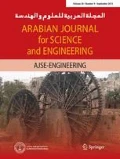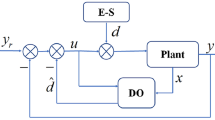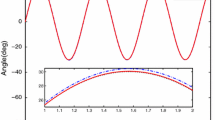Abstract
Many control structures have been proposed in the control literature to effectively deal with disturbances. Most of the control strategies show exceptional performance when the plant is subjected to additive input or output disturbance. Internal model control (IMC) has been proposed in the control literature, which covers a wide range of plants and guarantees good disturbance rejection properties. Few control strategies have been proposed if the plant is nonlinear and is subjected to multiplicative input disturbance. The multiplicative input disturbance changes the behaviour and the gains of the system at different operating points and cannot be rejected using conventional approaches. The paper discusses three different control structures to counteract the effect of the input disturbance. All the three control structures are variations of the Adaptive Direct Fuzzy Controller (ADFC). The fuzzy controller tries to develop an inverse model of the plant using feedback error learning. The control performance of the three control structures is compared using a modified Hammerstein model. It was successfully demonstrated that IMC is incapable of rejecting multiplicative input disturbance, and ADFC with the feedforward of the input disturbance is the optimal choice.

Similar content being viewed by others
References
Xie W.F., Rad A.B.: Fuzzy adaptive internal model control. IEEE Trans. IE 47, 193–202 (2000)
Economou, C.G.; Morari, M.: Internal model control. 5. Extension to nonlinear systems. Ind. Eng. Chem. Process Des. Dev. 25, 430–411 (1986)
Jang J.S.R., Sun C.T.: Neuro-fuzzy modeling and control. Proc. IEEE 83, 378–406 (1995)
Li, Y.; Rad, A.B.; Wong, Y.K.; Chan, H.S.: Model based control using artificial neural networks. In: Proceedings 1996 IEEE International Symposium Intelligent Control, pp. 283–288 (1996)
Oliveira J.V.D., Lemos J.M.: Long range predictive adaptive fuzzy relational control. Fuzzy Sets Syst. 70, 337–357 (1995)
Kadri, M.B.; Dexter, A.L.: Disturbance rejection in information-poor systems using an adaptive model-free fuzzy controller. In: Presented at The 28th North American Fuzzy Information Processing Society Annual Conference, 14–17 June, 2009, Ohio, USA (2009)
He M., Cai W.J., Li S.Y.: Multiple fuzzy model-based temperature predicitive control for HVAC systems. Inf. Sci. 169, 155–174 (2005)
Pomares H., Rojas I., Gonzalez J., Damas M., Pino B., Prieto A.: Online global learning in direct fuzzy controllers. IEEE Trans. Fuzzy Syst. 12, 218–229 (2004)
Gorez, R.; Neyer, M.D.; Baretto, J.: Fuzzy Internal Model Control in Engineering Systems with Intelligence. In: Tzafestas, P.G. (ed.) Kluwer, Amsterdam, pp. 415–422 (1991)
Edgar C.R., Postlethwaite B.E.: MIMO fuzzy internal model control. Automatica 34, 867–877 (2000)
Sousa J.M., Babuska R., Verbruggen H.B.: Fuzzy predictive control applied to an air-conditioning system. CEP 5, 1395–1406 (1997)
Hepworth S.J., Dexter A.L., Willis S.T.P.: Neural network control of a non-linear heater battery. Build. Serv. Eng. Res. Technol. 15, 119–129 (1994)
Postlethwaite B.E.: Building a model-based fuzzy controller. Fuzzy Sets Syst. 79, 3–13 (1996)
Tan W.W.: An online modified least mean square algorithm for training neurofuzzy controllers. ISA Trans. 46, 181–188 (2007)
Garcia C.E., Morari M.: Internal model control. A unifying review and some new results. Ind. Eng. Chem. Process Des. Dev. 21, 308–323 (1982)
Gongsheng, H.; Dexter, A.L.: Predictive control based on TS fuzzy model with uncertain parameters. In: Fuzzy Control Robotics and Intelligent Control Conference, IFSA 2005 Beijing, pp. 812–817 (2005)
Kadri M.B.: System identification of a cooling coil using recurrent neural networks. Arab. J. Sci. Eng. 37, 2193–2203 (2012)
Kadri, M.B.: Disturbance rejection in information poor systems using model free neurofuzzy control. D.Phil Thesis, University of Oxford (2009)
Kadri, M.B.: Disturbance rejection in model free adaptive control using feedback. Presented at the 29th IASTED international conference on modeling identification and control, Innsbruck, Austria, 15–17 Feb 2010
Kadri, M.B.; Hussain, S.: Model free adaptive control based on FRM with an approach to reduce the control activity. Presented at 2010 IEEE international conference on systems man and cybernetics (SMC), Istanbul, Turkey (2010)
Kadri, M.B.:Robust model free fuzzy adaptive controller with fuzzy and crisp feedback error learning schemes. Presented at 12th international conference on control, automation and systems (ICCAS), Jeju, South Korea (2012)
Kadri, M.B.: Disturbance rejection in nonlinear uncertain systems using feedforward control. Arab. J. Sci. Eng. 1–12 (2012)
Author information
Authors and Affiliations
Corresponding author
Rights and permissions
About this article
Cite this article
Kadri, M.B. Control Structures for Multiplicative Input Disturbance Rejection using Adaptive Direct Fuzzy Controllers. Arab J Sci Eng 38, 1427–1435 (2013). https://doi.org/10.1007/s13369-013-0538-9
Received:
Accepted:
Published:
Issue Date:
DOI: https://doi.org/10.1007/s13369-013-0538-9




